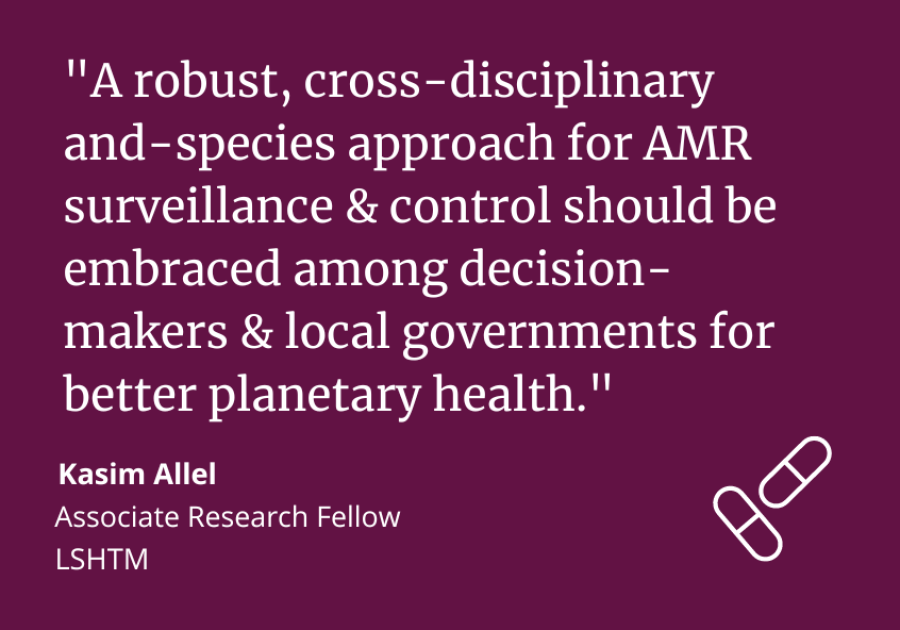Antibiotic consumption and resistance ‘two-way street’ between animals and humans
4 April 2023 London School of Hygiene & Tropical Medicine London School of Hygiene & Tropical Medicine https://lshtm.ac.uk/themes/custom/lshtm/images/lshtm-logo-black.png
Scientists have demonstrated for the first time that, globally, the association between antibiotic consumption and antimicrobial resistance (AMR) between human and animals goes both ways.
The findings, published in The Lancet Planetary Health, reveal that using antibiotics in animals is associated with AMR in humans and using antibiotics in humans is associated with AMR in animals.
The study highlights the urgent need for an integrated, cross-domain strategy to tackle the spread of AMR, focusing on social development, poverty reduction and enforcing tighter rules on the use of antibiotics.
Kasim Allel, lead author and Associate Research Fellow in Infectious Disease Epidemiology at the London School of Hygiene & Tropical Medicine (LSHTM) said: “AMR is a ‘wicked problem’ as conflicting priorities exist amongst an intricate web of stakeholders.
“A robust, cross-disciplinary and-species approach for AMR surveillance and control, which is not limited to a human-centred perspective, should be embraced among decision-makers and local governments for better planetary health.”
AMR is a major threat to global health, with resistant bacteria responsible for 1.27 million deaths in 2019.
Incorrect use of antibiotics (which include antibiotics, antivirals and antifungals) is a key driver of the spread of AMR. Rising demands for animal-based food and products, as well as intricate and interlinked socioeconomic and environmental factors, are also highly influential.
In this study, an international team of researchers, including from LSHTM, investigated links between the global consumption of antibiotics and rates of AMR in humans and food-producing animals around 2018. The authors also considered the influence of socioeconomic, health and environmental risk factors.
As predicted, overall, greater consumption of antibiotics in animals is associated with an increased rate of AMR in food-producing animals, with higher rates of human consumption of antibiotics increasing the risk of AMR in humans.
However, the paper also uniquely revealed a global bi-directional relationship between humans and animals. Namely, greater consumption of antibiotics by animals is associated with an increased risk of AMR in human pathogens (defined as critical priority by the World Health Organization), while greater human consumption of antibiotics increases the risk of AMR in animals.
Despite recording low levels of antibiotic consumption, low- and middle-income countries, notably in Asia (such as Bangladesh, China and India), had the highest rates of AMR in food-producing animals, suggesting that antibiotic consumption may be a secondary risk factor to the spread of AMR in certain areas of the world.
Socioeconomic factors, such as income inequality or death rates due to unsafe hygiene practices or heart problems, also increased rates of AMR in humans.
Consistent with previous research, these findings highlight that factors that typically reflect lower socioeconomic status are associated with an increased likelihood of AMR in humans. The authors argue that this further emphasises the importance of strong governance and anti-corruption within a ‘One-Health’ context, which emphasises the interdependency between animals, humans and the environment.
The team conclude that reducing antibiotic consumption alone will not be enough to fight the global spread of AMR. Instead, they state that integrated control methods focused on reducing poverty and supporting social development will be needed to prevent the transmission of resistance between humans and animals.
They also emphasise the importance of strengthening surveillance efforts, especially in low-and middle-income countries, and ensuring that livestock surveillance for AMR in particular, mirrors surveillance in humans.
Laith Yakob, senior author and Taught Programme co-Director of the Faculty of Infectious and Tropical Diseases at LSHTM said: “This bidirectionality in antibiotic consumption and resistance among humans and livestock uncovered by our analysis offers novel opportunities for mitigating resistance. For example, it highlights the potential for targeting single One-Health components with interventions but having system-wide impacts.
“Designing interventions around this holistic picture of resistance will be essential in tackling what has rapidly become one of the biggest threats to global health.
“Going forward, we recommend tighter country policies and regulations on antibiotic use and prescription among animals and humans, as well as improved governance, transparency and accountability, particularly among countries with the highest disease burdens.”
Publication
Allel et al.,Global antimicrobial-resistance drivers: an ecological country-level study at the human–animal interface’. The Lancet Planetary Health 2023. DOI: https://doi.org/10.1016/S2542-5196(23)00026-8
Further information
If you are interested in studying for the MSc in One Health: ecosystems, humans and animals at LSHTM, you can find out more here.
Selected media coverage
The Independent - Antibiotics and resistance 'two-way street' between animals & humans - study
Evening Standard - Antibiotics and resistance 'two-way street' between animals & humans - study
Mail Online - Antibiotics and resistance 'two-way street' between animals & humans - study
LSHTM's short courses provide opportunities to study specialised topics across a broad range of public and global health fields. From AMR to vaccines, travel medicine to clinical trials, and modelling to malaria, refresh your skills and join one of our short courses today.